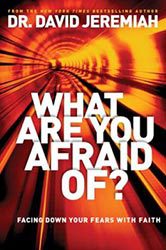 A response to Dr. David Jeremiah’s book, What Are You Afraid Of?: Facing Down Your Fears With Faith
A response to Dr. David Jeremiah’s book, What Are You Afraid Of?: Facing Down Your Fears With Faith
By Suzanne Ross
In the final chapter of his new book What Are You Afraid Of?: Facing Down Your Fears With Faith, Dr. David Jeremiah addresses the question of whether or not we should fear God. In the previous chapters he has taken on one fear after another – including fear of natural calamity, illness, financial loss, of rejection, being alone and dying – claiming that we can overcome any and all of these fears by turning to God. He succinctly states his approach in the introduction: “God Himself is the answer to all our fears.” Yet in the last chapter, he gives fear of God a different treatment. Rather than advising that we overcome our fear of God by turning to God (a delightfully profound paradox!), he tells us that fear of God is a good thing and an essential part of the Christian faith. In what follows, I’d like to respectfully disagree with his claim by using the insights about the Bible offered by René Girard’s mimetic theory.
The central point in Dr. Jeremiah’s argument for embracing our fear of God is that God possesses a dual nature. God is both loving and wrathful and this dual nature inspires a dual response in us, so that we find ourselves loving God and fearing Him at the same time. To abandon our fear, his argument goes, would be to lose contact with the reality of who God is. This “reality” of God is presented to us by the Bible itself. Throughout the chapter, Dr. Jeremiah carefully cites Biblical passages presenting God as loving, merciful and forgiving as well as those in which God is angry, judgmental and punishing. Dr. Jeremiah interprets these apparently contradictory texts according to the principle of biblical inerrancy. Because the Bible is inerrant (free from error), every word in the Bible is true. Therefore because the Bible offers verses attesting to these qualities, God is both loving and fearful, forgiving and judgmental, merciful and punishing. Dr. Jeremiah concludes by chiding, “How silly to think that if He is a loving God, He cannot also be a fearsome God. The two attributes complement each other.”
How exactly do they complement each other? He explains: “Is it possible to love God and fear Him at the same time? The Bible says it is. In several places, the Old Testament commands us to both love God and fear Him.” He cites the appearance of God on Mount Sinai to show that God puts fear in us for our own good:
Israel witnessed firsthand what God was doing when they camped before Mount Sinai to receive the law. They heard thunder rumbling… saw lightning slash violent gashes across the firmament… trumpets blared as smoke rose from the mountain toward heaven… The people, quaking with fear, were terrified at what God was doing. Moses [explained], “Do not fear; for God has come to test you, and that His fear may be before you, so that you may not sin” (Exodus 20:20) p. 203
According to Dr. Jeremiah, God’s love for us is expressed by his fearsomeness. This fearsomeness is even necessary to comprehend the depth of God’s forgiveness, which Dr. Jeremiah recognizes as a defining characteristic of God. Forgiveness becomes real only because God has the desire, the will, and the power to punish us, even destroy us, something we fully deserve. Because of sin, “we have actually become God’s enemies” (p. 198) and so are legitimate targets of divine vengeance. And yet God restrains His wrath. “His continuing love for us is the only thing that sustains us and moves Him to offer forgiveness instead of our deserved destruction.” (p. 204) God’s dual nature – loving and wrathful – manifests itself in God’s desire to destroy us but His refusal to do so. This invokes the ambivalent nature of the sacred as described by German theologian Rudolf Otto: God is both “fascinating and terrifying” and the Bible tells us so.
I do not dispute that human terror as a response to God is Biblical, nor do I dispute that the Bible is a source of truth and divine revelation. But the Bible also tells us the truth about ourselves, something Dr. Jeremiah implicitly accepts. He shows us throughout the book how the Bible accurately describes human fears and emotions: Hezekiah weeping over his ill health in Isaiah 38:2-3; the people grieving at Moses’ death in Deuteronomy 34:8; and Peter’s fear of being rejected in the high Priest’s courtyard in John 18:18, just to name a few. Dr. Jeremiah and I are in agreement, I think, that the Bible truthfully, and we could even say without error, tells us not only about God but about ourselves.
But here is the point that Girard’s reading of the Biblical text allows us to see, a point that Dr. Jeremiah misses: The Bible tells the truth about the errors we make about God. One of those errors is attributing our own wrath to God. When we mistakenly read Biblical descriptions of this human error as descriptions of God’s nature, we fall into the same mistake made by our ancestors – we fall into idolatry. The idols worshiped by the Israelites in the Bible belong to the ancient mythological world which was populated by dual-natured or two-faced gods. These ancient gods were fascinating and terrifying in ways we can scarcely imagine. The ancients believed that these gods had the desire, will and power to destroy human beings and very little constrained them. Ancient myths tell of plagues, pestilence, military defeats, murderous orgies, parents killing children, and monsters threatening entire communities, all of which was blamed on the gods.
Yet Girard’s cross cultural study of ancient myths led him to a striking conclusion: the violence depicted in the myths, even and perhaps especially when it was attributed to the gods, was actually human violence. Plagues and pestilence were mythological euphemisms for civil wars, riots and unending cycles of revenge that were devouring communities as surely as locusts devour crops. Now here’s the really interesting thing: What Girard’s study revealed was that the cure for the plague of human violence used by our ancestors was sacrifice. That’s right, the bloody offering of a ritually pure animal on a sacrificial altar to the gods. From our vantage point we are tempted to diagnosis their faith in a sacrificial cure as delusional. But they believed for good reason that the only way to end the torrent of bloodletting was by spilling a little blood on an altar. Why? There was nothing delusional about it: Gathered around the sacrificial fires, ancient people experienced a cathartic release from the anger, resentment, and jealousies fueling their violence. Sacrifice calmed the community and transported them from fear at the gods’ wrath to joy at their forgiveness.
Faith in sacrifice emerges from a world dominated by mythological thinking. When the Biblical God tries to break through this mythological haze with a clear communication about Himself, He finds Himself getting blamed for violence in much the same way as the mythical gods. When misfortune (Job) or military disaster (Joshua) struck, or when orgies of sex and violence swept through a community (Sodom and Gomorrah), God gets blamed for it and is assumed to be fixing things with swift justice. Like the people worshipping false gods, we mistakenly believe that God prevents bad things from happening by being a little bad Himself. Yet God persists in calling us into a new understanding of His nature and a new relationship with Him and each other.
There is a better way to make sense of the conflicting Biblical descriptions of God, one that does not slip into idolatry but that allows the full force of the biblical revelation about God to begin to break through. Theologian James Alison offers us this better way in his interpretation of the two competing images of God – the wrathful one on Mount Sinai with the peaceful, forgiving presence of the resurrected Christ. Alison is careful to draw our attention to the human violence present at the cross, insisting that we do not repeat the mistake of our ancestors by blaming God or the gods for human violence. He calls us to recognize that Jesus was a victim of human scapegoating violence like countless others before and since his time on earth. On the cross Jesus occupies the place of our scapegoated victims and social outcasts, and shows us the truth about ourselves, the way we vent our anger against these hated others and form a unity around them. Jesus was blamed as a trouble maker, accused of sedition and heresy, and the Priestly and Roman authorities had him killed for one simple reason: to forestall the wrath of the Empire. Caiaphas succinctly summarizes humanity’s use of a small dose of violence to end a torrent in John 11:50: “You do not understand that it is better for you to have one man die for the people than to have the whole nation destroyed.” Differing with Dr. Jeremiah, I would say that we have much more to fear from each other than we do from God. Allow me to offer James Alison’s picture of God from which we have nothing to fear:
The whole drift of what Jesus was doing was fulfilling the gathering which began around the Presence on Sinai with Moses. But it turned out that the fullness of the Presence wasn’t the frightening presence of God as it had been perceived at Sinai. It turned out that the presence of YHWH at Sinai had been that of a forgiving victim, the scapegoat come back… shown to have been actively creating this breakthrough moment all along. And that all the wrath that had been perceived round Sinai had been projection from wrathful people onto a voice that could scarcely be heard breaking through to them. Instead it turns out that the Presence is a victim, one who is forgiving us, and we are starting to say “Oh, so that’s what I’ve been involved in – but now I can become something else.” Automatically the hearing of the voice of the Forgiving Victim is the inauguration of a new sort of relationship. (Page 309, Jesus the Forgiving Victim: Listening for the Unheard Voice)
Getting to know the God revealed to us through Jesus would indeed be the answer to all our fears, including our fear of God. As we read in the first letter of John 4:18 “[God is love, and…] There is no fear in love, but perfect love casts out fear; for fear has to do with punishment, and whoever fears has not reached perfection in love.” Amen.
For more conversation on What Are You Afraid Of?, visit the Patheos Book Club here.













